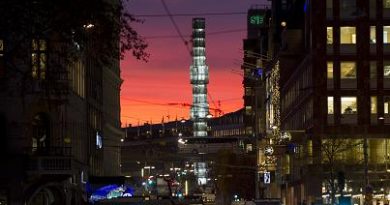Construction of pipeline across the Yenisey under way in Arctic Russia

The 5,8 km long pipeline is key component of Vostok Oil, the biggest industrial project currently unfolding in the Russian Arctic.
According to Russian state oil company Rosneft and its subsidiary RN-Vankor, as many as 25 ships have in the course of summer 2023 taken part in dredging operations in the Yenisey.
As winter approached, the company started laying the pipeline on the riverbed.
The pipes have a 820 mm diameter and wall thickness of 22 mm, RN-Vankor informs on social media VK.
The 5,8 km long installation will connect the eastern and western shores of the major Arctic river. Its starting point is in the village of Tochina, about 60 km north of Dudinka.
Clock ticking for Rosneft
Rosneft is under great time pressure to build the Vostok Oil. On a number of occasions, company CEO Igor Sechin has reiterated that the project will produce more than 30 million tons already in 2024. By 2030, the Vostok Oil will produce more than 100 million tons per year, most of it to be exported through the Northern Sea Route to Asian buyers.
A significant number of wells are drilled in the Taymyr Peninsula and several hundred km of pipeline are under construction. The oil will be exported from the Sever Terminal on the coast of the Yenisey Bay.
In the course of summer 2023, more than one million tons of goods have reportedly been shipped to the construction sites along the Yenisey, including 120,000 tons of oil pipes.
Rosneft have developed 21 mooring point for ship deliveries in the area and as many as 402 ships have reportedly been involved in project shipments this year, the company informs.
The hydrocarbons produced in Vostok Oil constitute a key part of the ambitious goods estimates outlined by the Kremlin.
The Vostok Oil will make a major industrial impact on the vulnerable Arctic nature of the Taymyr Peninsula. But little information is made available about consequences for Taymyr tundra, nor the marine environment of the Yenisey.
Related stories from around the North:
Canada: Arctic Canadian community says oil moratorium renewal doesn’t go far enough, Eye on the Arctic
Norway: Equinor postpones decision on northernmost oil field, The Independent Barents Observer
Russia: First train crosses new bridge to western side of Kola Bay in Arctic Russia, The Independent Barents Observer
Sweden: Will the green transition be the new economic motor in the Arctic?, Eye on the Arctic
United States: Biden closes half of NPR-A acreage in Arctic Alaska to oil drilling, Alaska Public Media



